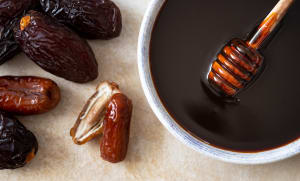Ancient wine flows again as 1,000-year-old grape seeds revive in Israel’s Negev

Once a global hub of wine production, an ancient tradition has been revived in the Negev desert with grape seeds that are 1,000 years old.
Not long after the Bible was written, grapes were grown in abundance in the Avdat region, just south of Sde Boker where David Ben Gurion – Israel's first prime minister – is buried. Now the vineyards are being restored to the grape growing center it used to be 1,500 years ago, YNet reports.
Just weeks before the Oct. 7 massacre, the heritage vineyard at Avdat was inaugurated as the ancient seeds were planted in seven terraces in September 2023.
The seeds were found several years ago by a team from the University of Haifa who were researching the Byzantine Empire and its eventual collapse. They explored a sealed cave at the archeological site at Avdat and discovered the ancient treasures inside. The team then identified the genetic traits of the grape seeds which were said to produce the world’s finest wine, and set about resurrecting the ancient vines.
Now, almost two years into the project, the harvest is finally ripe. The seeds were of the Dabouki grape variety, along with some Bar and Siriki grapes, and harvesting is being done by hand.
“The Byzantines in the Negev were a powerhouse,” explained Dr. Lior Schwimmer, Israel’s southern district heritage officer and regional archaeologist, who led the team of harvesters.
“They produced wine in the lowlands and coastal plains, but doing so in the Negev was extraordinary. Before then, the Negev yielded little beyond goats or copper. Yet they managed to produce wine on a massive scale, millions of liters and export it to Europe,” he told YNet News.
“There are many theories about how that wine tasted. It was made differently, without sulfur. Today, we might call it unpalatable. We don’t really know. Now we use cold-crushing techniques, even clay vessels and we’ll get there, too. The next step is to recreate their production methods using ancient tools,” he said.
“We harvested using ancient methods, and not all the grapes were ripe. That’s typical of ancient varieties, which ripen at different times. We had to taste nearly every cluster to decide whether to leave it or pick it,” the expert continued.
Some 20 kilograms (44 pounds) of grapes have now been harvested at the site, enough to produce approximately 12 bottles of wine.
“It’s not a large quantity, just a few dozen kilos to give us insight into the process. In two or three weeks, we’ll harvest the Bar and Siriki,” Dr. Schwimmer added.
Their goal is to reach about 100 bottles this year, and 800 bottles next year. “I’m incredibly excited. We’ve been working on this for two years, with a grape variety not grown here for centuries,” he said.
“Everything is a first. This vineyard is like a baby. Holding a bottle of wine feels like a distant dream but it’s getting closer. Ultimately, we dream of a clay jug of ancient Byzantine wine, taking a sip and saying, ‘Wow, that’s delicious.’”
Helping the team with the process of producing the wine itself is Gidi Talmor, a high-tech professional from Moshav Lachish. Talmor has been producing hundreds of bottles of homemade wine each year using grapes from vineyards in the Negev and Zichron Yaakov.
“The way I make wine aligns with the vineyard’s story,” he assured, explaining his process.
“I produce it without external interference. Modern winemaking involves filtration, shading, sulfur and yeast. In ancient times, they used clay jars, not wooden barrels, which alter the grape’s flavor. I keep it simple, letting the grapes and nature do their work. Here’s hoping for the best.”
The Pinto Winery in Yeruham has also joined the project. Jewish laws prohibiting the use of fruit grown in the first three years mean they cannot directly help with the harvest, but they are providing advice and support to the researchers.
After three years the vineyard will be kosher, something Dr. Schwimmer is excited to see.
“Next year, the vineyard will be usable and we’ll dive deeper into the experiment,” he enthused.
Other experts and professionals have shown interest in the venture, including Negev Highlands wineries who will share some of the harvest from the Bar and Siriki varieties.
Israel’s Nature and Parks Authority is also invested in this business of reviving ancient crops. Together with cultivating ancient pomegranate trees they have taken cuttings from ancient fig trees in Nahal Akrab and Mount Hamran in the Negev, and from olive trees from Har Boker and Nahal Zavitan, which will be planted in the coming months. Add to that the remarkable story of the 2,000 year old date seed which was successfully planted in the Arava, and it seems all seven species promised to Israel by God are still producing fruit, just as they were back in the Bible times.
“For the Lord your God is bringing you into a good land, a land of brooks of water, of fountains and springs, flowing out in the valleys and hills, a land of wheat and barley, of vines and fig trees and pomegranates, a land of olive trees and honey, a land in which you will eat bread without scarcity, in which you will lack nothing, a land whose stones are iron, and out of whose hills you can dig copper. And you shall eat and be full, and you shall bless the Lord your God for the good land he has given you.” (Deuteronomy 8:7-10)

Jo Elizabeth has a great interest in politics and cultural developments, studying Social Policy for her first degree and gaining a Masters in Jewish Philosophy from Haifa University, but she loves to write about the Bible and its primary subject, the God of Israel. As a writer, Jo spends her time between the UK and Jerusalem, Israel.
You might also like to read this:















